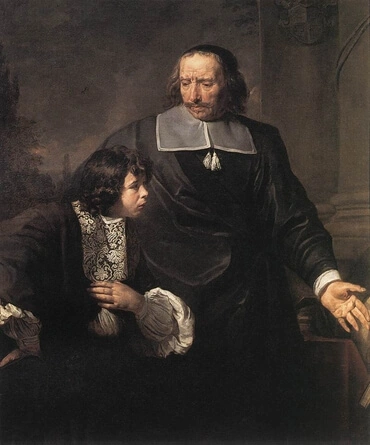Apocalypse Explained # 1186
1186. And no craftsman of whatsoever craft shall be found in thee any more, signifies no more wisdom, intelligence, or knowledge. This is evident from the signification of "craftsman of whatsoever craft," as being everything belonging to the understanding, consequently wisdom, intelligence, and knowledge, for these belong to the understanding, the inmost of which is wisdom, the middle intelligence, and the lowest is knowledge. This is the signification of "craftsman of whatsoever craft," because these are endowments of the understanding, and its endowments are signified by "crafts." As these are signified by "crafts," so in the Word where the construction of the tabernacle is treated of, also the garments of Aaron, which were of gold, blue, purple, scarlet double-dyed, and fine twined linen, it is said that they were to be the work of the "craftsman," elsewhere "a work of a contriver" (Exodus 26:1, 31; 28:6; 39:8; and elsewhere). The things of which these were made, and which are here mentioned, signify things of wisdom, intelligence, and knowledge; therefore of Bezaleel and Oholiab, who were the craftsmen, and who made these things, it is said:
They were filled with wisdom, intelligence, and knowledge (Exodus 31:3; 36:1-2).
[2] That "craftsman" signifies intelligence from what is one's own [proprium] is evident in Hosea:
They make them a molten image of their silver, and idols in their intelligence, all of it the work of the craftsmen (Hosea 13:2).
"Molten image" and "idol" signify worship according to doctrine that is from self-intelligence; "silver" signifies the falsity from which such doctrine comes; therefore it is said "that in their intelligence they make them an idol, all of it the work of craftsmen." So in Isaiah:
The craftsman melteth a graven image, and the goldsmith spreadeth it over with gold, and casteth chains of silver; he seeketh a wise craftsman (Isaiah 40:19-20).
And in Jeremiah:
Silver spread into plates is brought from Tarshish, and gold from Uphaz, the work of the craftsman and of the hands of the founder, hyacinthine and garments, all of it the work of the wise (Jeremiah 10:3, 9).
Here and in many passages elsewhere self-intelligence is described by "idols," and "sculptured and molten images" (See n. 587, 827).
(Continuation)
[3] End, mediate causes, and effect, are called also the chief end, intermediate ends, and the final end. Intermediate and final ends are called ends, because the chief end produces them, is everything in them, is their esse and is their soul. The chief end is the will's love in man, the intermediate ends are subordinate loves, and the final end is the love of the will existing as it were in its effigy. As the chief end is the love of the will it follows that intermediate ends, being subordinate loves, are foreseen, provided, and produced through the understanding, and that the final end is the use foreseen, provided, and produced by the love of the will through the understanding, for everything that love produces is a use. This must be premised in order that what has just been said may be perceived, namely, that eminence and riches may be blessings or that they may be curses.
Man (male)

The relationship between men and women is deep and nuanced, and one entire book of the Writings -- Conjugial Love -- is devoted to the subject. So we can hardly offer a full explanation here. In a very general sense, though, the Writings say that men are creatures of intellect, driven by the love of growing wise; women, meanwhile are creations of affection, driven by the love of wisdom and the good that wisdom can do. They are formed this way to reflect the Lord's Divine Love and Divine Wisdom, and so that they can form marriages that reflect the unity of Divine Love and Divine Wisdom. Marking differences between men and women can be a touchy thing, but realistically it's easy to see that men tend to love acquiring knowledge whether it has any practical application or not. Many of them can spout out sports statistics or hold court on the workings of the internal combustion engine, even though it is knowledge they are not likely to ever use. They find such knowledge interesting for its own sake. It follows, then, that when the Bible speaks of men, the men represent facts, ideas, knowledge, truth, intellect and wisdom -- or in the negative sense falsity, twisted logic, and reasoning that is devoid of concern for others.






